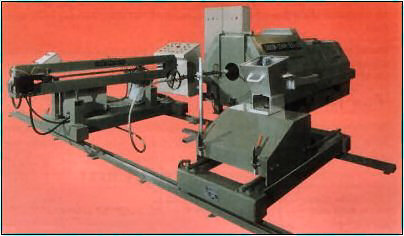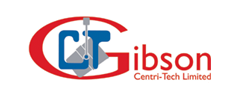Gibson Centri-Tech
Post from Cast Metal Times April/May 2002
Gibson Centri-Tech Ltd is recognised as one of the world’s leading exponents of centrifugal casting technology. With more than 30 years experience, the company has remained at the forefront of developments in the design and manufacture of centrifugal casting systems, approved to ISO 9001:1994.

Gibson Centri-Tech can design both horizontal and vertical axis machines capable of producing components in most metals and alloys
Gibson Centri-Tech’s recognised strengths – experience, innovation and quality – are combined with a wide diversity of foundry knowledge enabling the company to fully understand and fulfil customer’s needs wherever they are located in the world.
Gibson Centri-Tech can design both horizontal and vertical axis machines capable of producing components in most metals and alloys weighing anything from a few grammes to several tonnes for the most cost effective implementation of customers requirements.
The company can also offer a full plant layout and foundry design service using the latest technology.
Before delivery, each machine is thoroughly tested to the most rigourous standards. This approach provides the basis for rapid, trouble free installation on site, where Gibson Centri-Tech’s experience in project management and commissioning, ensures that every aspect of the scheme is coordinated to meet the production deadlines and performance criteria.
Today centrifugal casting technology has been refined to a point where technical sophistication can be achieved without undue complexity. This ensures the long term reliability of machines and minimises the training of operators.
More than 80% of the centrifugal casting machines produced by Gibson Centri-Tech are exported to customers throughout the world and in addition it provides a broad range of complementary services comprising:
- Turnkey projects
- Production management
- Metallurgical control techniques and on site backup
- Contracting for complete foundry and machine shop installations hi mass production and jobbing foundries
- On site electrical and control system installations.
he practice of centrifugal casting, whereby hot metal is poured into a rotating mould, has a number of advantages over traditional static diecasting methods. Centrifugal force brings about an even distribution of the metal and forces gases and other impurities out of the critical section of each casting – resulting in consistent, high quality output with superior physical properties. By refining the operating techniques and upgrading its programmable machines with a number of innovative features, Gibson Centri-Tech has improved still further the efficiency and productivity of a well established process.
Great care is taken at the conception of each machine to comply with standards of health and safety governed by legislation both in the UK and overseas. Gibson Centri-Tech is particularly mindful of the necessity to prevent noise and dust pollution.
The Alpha Gyra horizontal range of machines are designed to be flexible and to meet the requirements of one off jobbing and medium to mass production runs. Applications include; cylinder liner castings for diesel and petrol engines, gear wheel blanks, high duty bushes for automotive/engineering duties and pump sleeves. These machines have the advantage of quiet operation, casting ejection, low cost insert die system and low maintenance.
The Gyra Caster horizontal roller machines are generally used for tube and pipe production and are available as fully adjustable models or radial adjustment only. They were designed for flexibility in the production of various lengths and diameters of bushes, barrels and rolls for the food industry. They are also suitable for steel rolling and furnace run out rolls, radial heating tubes, marine diesel engine liners and bimetal rolls of many tonnes.
The GML machines are used by leading companies worldwide for the lining of all types of bearings including; rolling mill, power generation and tanker stern tubes. These machines are specifically designed to safely and economically cast white metal (Babbitt) into ferrous and non-ferrous housings in the form of bushes, bearings, half shells and shaped shells.
The SHPP machines originally designed for pipe production are also ideal for the manufacturer of cylinder liners for use with internal combustion engines. The machines are available in a range of sizes to produce both pipes and most types of cylinder liners either with profile or plain cylindrical castings. They have the advantage of flexibility, relatively low cost, simplicity and ease of maintenance. This makes them attractive to developing markets and producers with low labour costs.
The vertical ranges of machines are built to cover a wide scope of casting weights and sizes employing the latest programmable controls.
The UGV type comprises of floor mounted units manufactured for the production of conventional ring and bush type engineering castings. Applications include; reduction gearboxes, bearing cages, diesel engine parts, stainless steel flanges, valve bodies and rings.
The VBT verticaster range is suitable for all types of engineering castings, rolls for pulverisation duties, rolling mill adjustment screws up to six tonnes and large diameter dredging bearings.
The VC models are at the top end of the range with table capacities exceeding lOOt. They are high capacity, high speed machines used mainly by roll making foundries for the production of large rolls and sleeves.
The carousel equipment has been developed as a moderately priced high production multi die system. Fully automatic and designed to employ either wet or dry die coating systems, together with improved mechanical utilisation this provides greater reliability with limited sophistication.
As specialists in the design and manufacture of this equipment Gibson Centri-Tech’s business services the technical needs of foundries and allied industries worldwide, with a corresponding emphasis on superior standards of quality and service. To this end, research and development play a key role in perfecting the many technical innovations associated with the machinery – innovations aimed at maximising both production and operational flexibility to customers.
